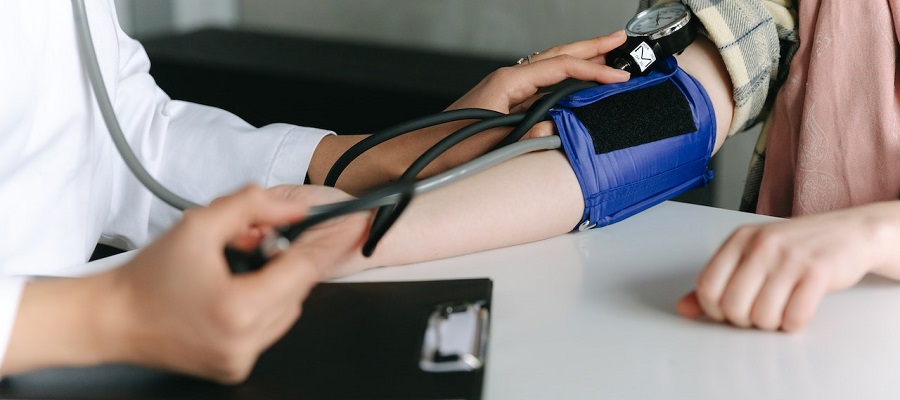High blood pressure, also known as hypertension, is a condition in which the blood vessels have a consistently high pressure against their walls. This can put strain on the heart and blood vessels and increase the risk of serious health problems like heart attack, stroke, and kidney disease.
Diet plays a role in the development of high blood pressure, and making certain dietary changes can help to lower blood pressure and reduce the risk of related health problems. Here are some dietary changes that may be beneficial for those with high blood pressure:
-
Reduce sodium intake: Sodium is a mineral that is found in many foods, and it can contribute to high blood pressure. Reducing sodium intake can help to lower blood pressure and reduce the risk of related health problems. Some ways to reduce sodium intake include choosing low-sodium options when shopping, cooking with fresh ingredients instead of canned or processed foods, and using herbs and spices instead of salt to flavor foods.
-
Increase potassium intake: Potassium is a mineral that can help to lower blood pressure. Increasing potassium intake can be beneficial for those with high blood pressure. Some good sources of potassium include fruits and vegetables, whole grains, nuts, and legumes.
-
Eat a diet rich in fruits and vegetables: Fruits and vegetables are rich in nutrients like potassium, fiber, and antioxidants, and they can help to lower
-
High salt intake: Consuming too much sodium, which is found in salt, can increase blood pressure. The American Heart Association recommends limiting sodium intake to no more than 2,300 mg per day, or 1,500 mg per day for those with high blood pressure or at increased risk for developing it.
-
Low potassium intake: Potassium is a mineral that helps regulate blood pressure. Consuming foods that are high in potassium, such as fruits, vegetables, and legumes, may help lower blood pressure.
-
Low fiber intake: Fiber is a type of carbohydrate that helps lower blood pressure. Foods that are high in fiber, such as fruits, vegetables, whole grains, and legumes, may help lower blood pressure.
-
High alcohol intake: Consuming large amounts of alcohol can increase blood pressure. The American Heart Association recommends limiting alcohol intake to no more than two drinks per day for men and one drink per day for women.
The effect of foods containing increased sodium in raising blood pressure
Sodium is an essential mineral that is necessary for the proper functioning of the body. It helps regulate fluid balance and is involved in a number of other important processes, such as muscle function and nerve transmission. However, consuming too much sodium can have negative effects on health, particularly for those with high blood pressure or at risk for developing it.
High blood pressure, or hypertension, is a common condition that occurs when the force of the blood against the artery walls is too high. This can damage the arteries and increase the risk of serious health problems, such as heart attack, stroke, and kidney disease. One of the key risk factors for high blood pressure is high sodium intake.
One of the main dietary factors that can contribute to high blood pressure is a high intake of sodium. When we consume too much sodium, it can cause an increase in the volume of fluid in the blood, which leads to an increase in blood pressure. This is because sodium attracts and holds onto water, and when there is too much sodium in the body, it can cause an excess of fluid to build up.
There are several mechanisms by which high sodium intake may contribute to high blood pressure. Sodium is found in salt, and when consumed in excess, it can lead to an increase in fluid retention. This can increase the volume of blood in the body, which in turn increases the pressure on the artery walls.
There is strong evidence to support the link between high sodium intake and high blood pressure. In fact, reducing sodium intake is one of the most effective ways to lower blood pressure and reduce the risk of cardiovascular disease.
While it is important to be mindful of sodium intake, it is also important to consume an overall healthy diet. This includes eating plenty of fruits, vegetables, whole grains, and lean proteins, and limiting intake of unhealthy fats, added sugars, and alcohol.
The American Heart Association recommends limiting sodium intake to no more than 2,300 mg per day, or 1,500 mg per day for those with high blood pressure or at increased risk for developing it. However, the average American consumes much more than this, with the average daily intake being about 3,400 mg per day.
In addition to increasing fluid retention, high sodium intake may also impair the function of the endothelium, the inner lining of the blood vessels. This can lead to an increase in blood pressure by reducing the ability of the blood vessels to relax and dilate.
Sodium is found in a variety of foods, particularly processed and packaged foods. Some common sources of sodium include:
-
Salt: Salt is a common source of sodium in the diet. It is added to many processed and packaged foods, as well as used in cooking and as a seasoning.
-
Baking soda: Baking soda is a common ingredient in baked goods and can contribute to sodium intake.
-
Monosodium glutamate (MSG): MSG is a flavor enhancer that is often added to processed and packaged foods.
-
Soy sauce: Soy sauce is a common condiment that is high in sodium.
-
Pickled foods: Pickled foods, such as pickles, sauerkraut, and olives, are high in sodium due to the preserving process.
-
Cured meats: Foods like bacon, ham, and salami are high in sodium due to the curing process.
-
Frozen dinners: Frozen dinners and other pre-packaged meals are often high in sodium.
-
Soups: Many soups, particularly canned soups, are high in sodium.
-
Breads and pastries: Some breads and pastries are high in sodium due to the use of salt as a flavor enhancer.
-
Snack foods: Chips, pretzels, and other snack foods are often high in sodium.
-
Condiments: Some condiments, such as soy sauce and salad dressing, are high in sodium.
Effect of foods high in trans fats in raising blood pressure
Trans fats are a type of unsaturated fat that is found in some processed and packaged foods, as well as in some fried foods. Trans fats are formed when liquid oils are partially hydrogenated, which makes them more solid and stable at room temperature. They are often used in processed foods because they have a longer shelf life and can improve the texture and flavor of some products.
Consuming foods high in trans fats has been linked to a number of negative health effects, including an increased risk of heart disease and high blood pressure. High blood pressure, or hypertension, is a common condition that occurs when the force of the blood against the artery walls is too high. This can damage the arteries and increase the risk of serious health problems, such as heart attack, stroke, and kidney disease.
Studies have shown that consuming trans fats can increase blood pressure by raising levels of "bad" LDL cholesterol and lowering levels of "good" HDL cholesterol. This can lead to the build-up of plaque in the arteries, which can narrow and harden them, increasing the risk of high blood pressure and other cardiovascular problems.
Trans fats are found in a variety of foods, including fried foods, baked goods, and some snack foods. They are also found in some margarines and vegetable shortenings. It is important to be mindful of the amount of trans fats in your diet and to choose foods that are lower in trans fats whenever possible.
The American Heart Association recommends limiting trans fat intake as much as possible. To reduce your intake of trans fats, it is a good idea to choose foods that are made with liquid oils, such as olive oil or canola oil, instead of partially hydrogenated oils. It is also a good idea to read nutrition labels and choose foods that are lower in trans fats.
In conclusion, consuming foods high in trans fats has been linked to an increased risk of high blood pressure and other cardiovascular problems. Limiting trans fat intake and choosing foods that are lower in trans fats can help reduce the risk of these health issues and improve overall health.
The effect of foods rich in saturated fats in raising blood pressure
Saturated fats are a type of fat that is found in some animal-based foods, such as meat, poultry, and dairy products, as well as some plant-based foods, such as coconut oil and palm oil. Saturated fats are solid at room temperature and are often used in processed foods to improve texture and flavor.
Consuming foods high in saturated fats has been linked to a number of negative health effects, including an increased risk of high blood pressure and other cardiovascular problems. High blood pressure, or hypertension, is a common condition that occurs when the force of the blood against the artery walls is too high. This can damage the arteries and increase the risk of serious health problems, such as heart attack, stroke, and kidney disease.
Studies have shown that consuming saturated fats can increase blood pressure by raising levels of "bad" LDL cholesterol and lowering levels of "good" HDL cholesterol. This can lead to the build-up of plaque in the arteries, which can narrow and harden them, increasing the risk of high blood pressure and other cardiovascular problems.
Saturated fats are found in a variety of foods, including meat, poultry, dairy products, and some baked goods. They are also found in some plant-based oils, such as coconut oil and palm oil. It is important to be mindful of the amount of saturated fats in your diet and to choose foods that are lower in saturated fats whenever possible.
The effect of foods high in added sugars on raising blood pressure
Added sugars are sugars and syrups that are added to foods and beverages to sweeten them. They are found in a wide variety of foods, including baked goods, candy, soda, and some cereals and granolas. Added sugars are different from naturally occurring sugars, such as those found in fruits and dairy products.
Consuming foods high in added sugars has been linked to a number of negative health effects, including an increased risk of high blood pressure and other cardiovascular problems. High blood pressure, or hypertension, is a common condition that occurs when the force of the blood against the artery walls is too high. This can damage the arteries and increase the risk of serious health problems, such as heart attack, stroke, and kidney disease.
There is evidence to suggest that consuming large amounts of added sugars can increase blood pressure by increasing insulin resistance, which can lead to higher levels of "bad" LDL cholesterol and lower levels of "good" HDL cholesterol. This can lead to the build-up of plaque in the arteries, which can narrow and harden them, increasing the risk of high blood pressure and other cardiovascular problems.
In addition to their effects on blood pressure, added sugars are also linked to other negative health effects, such as weight gain and an increased risk of type 2 diabetes. The American Heart Association recommends limiting added sugar intake to no more than 6 teaspoons (24 grams) per day for women and 9 teaspoons (36 grams) per day for men.
To reduce your intake of added sugars, it is a good idea to choose foods that are lower in added sugars and to read nutrition labels to determine the amount of added sugars in the products you buy. It is also a good idea to choose whole, unprocessed foods instead of processed and packaged foods, which tend to be higher in added sugars.
In conclusion, consuming foods high in added sugars has been linked to an increased risk of high blood pressure and other cardiovascular problems. Limiting added sugar intake and choosing foods that are lower in added sugars can help reduce the risk of these health issues and improve overall health.
Conclusion: Managing High Blood Pressure
High blood pressure, or hypertension, is a common condition that can increase the risk of serious health problems, such as heart attack, stroke, and kidney disease. There are several dietary factors that can contribute to high blood pressure, including high salt intake, low potassium intake, low fiber intake, high alcohol intake, high trans fat intake, high saturated fat intake, and high added sugar intake. To manage high blood pressure, it is important to be mindful of these dietary factors and make changes to your diet as needed, such as limiting salt intake, increasing potassium intake, increasing fiber intake, limiting alcohol intake, and limiting trans fat and saturated fat intake.


